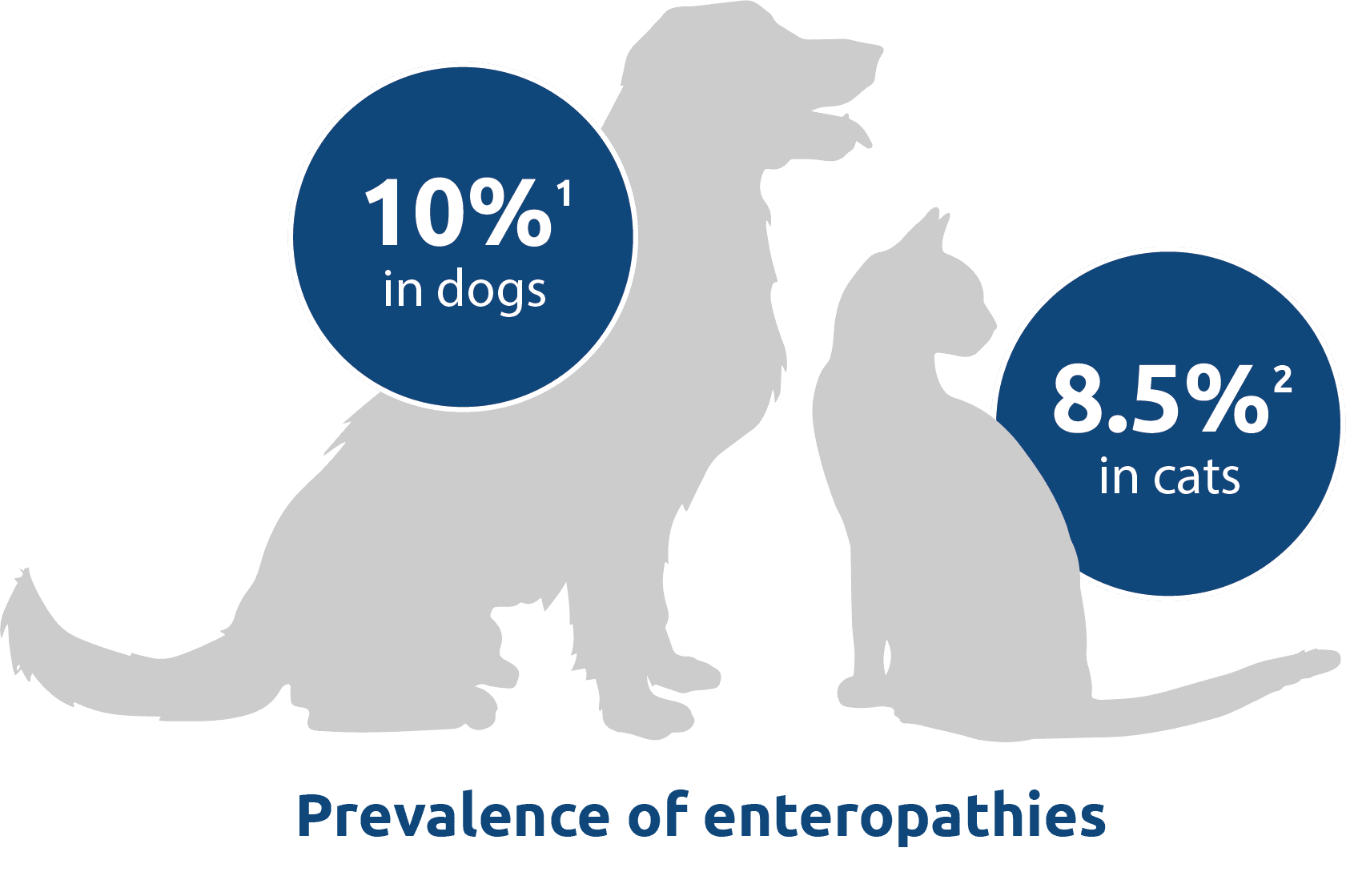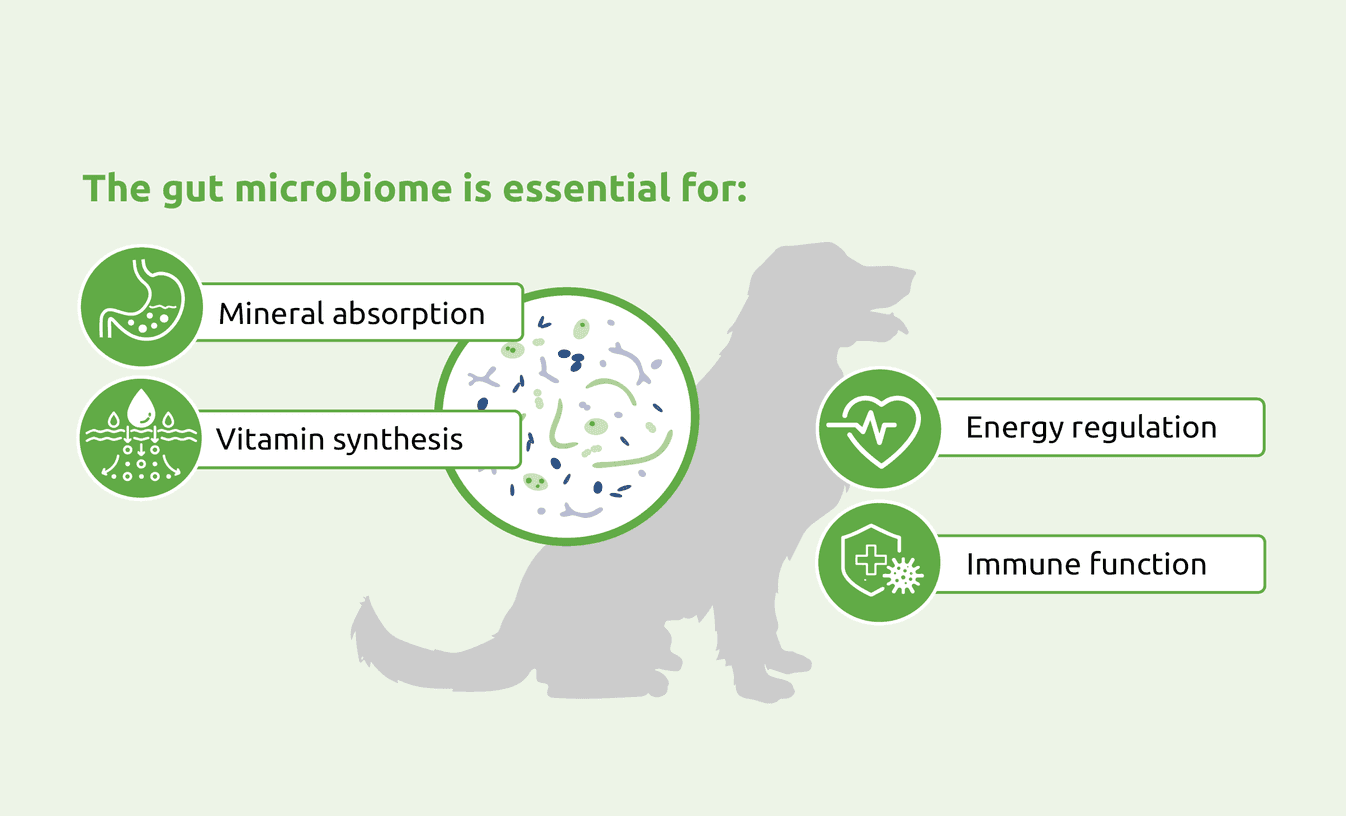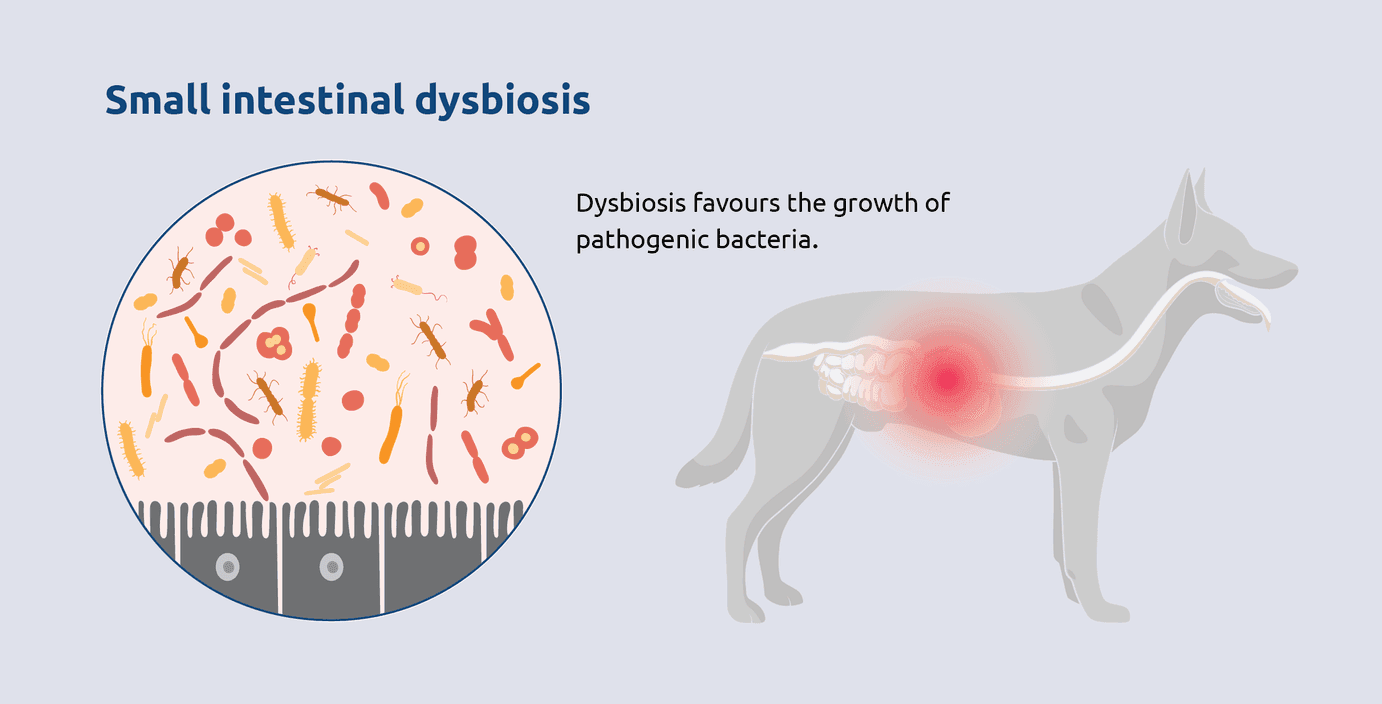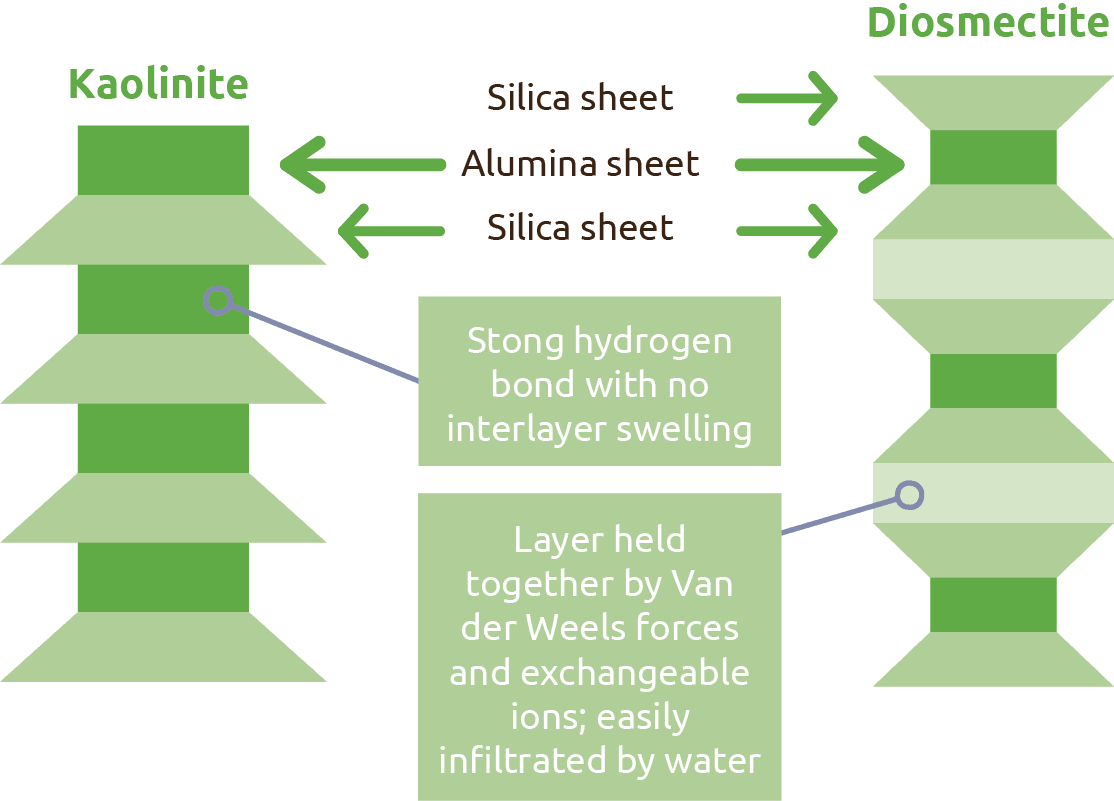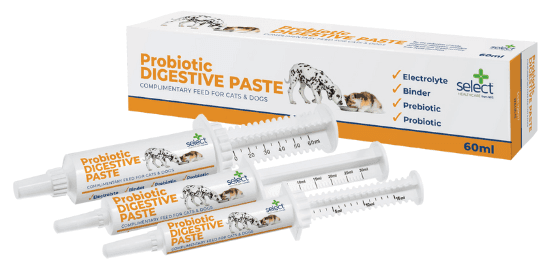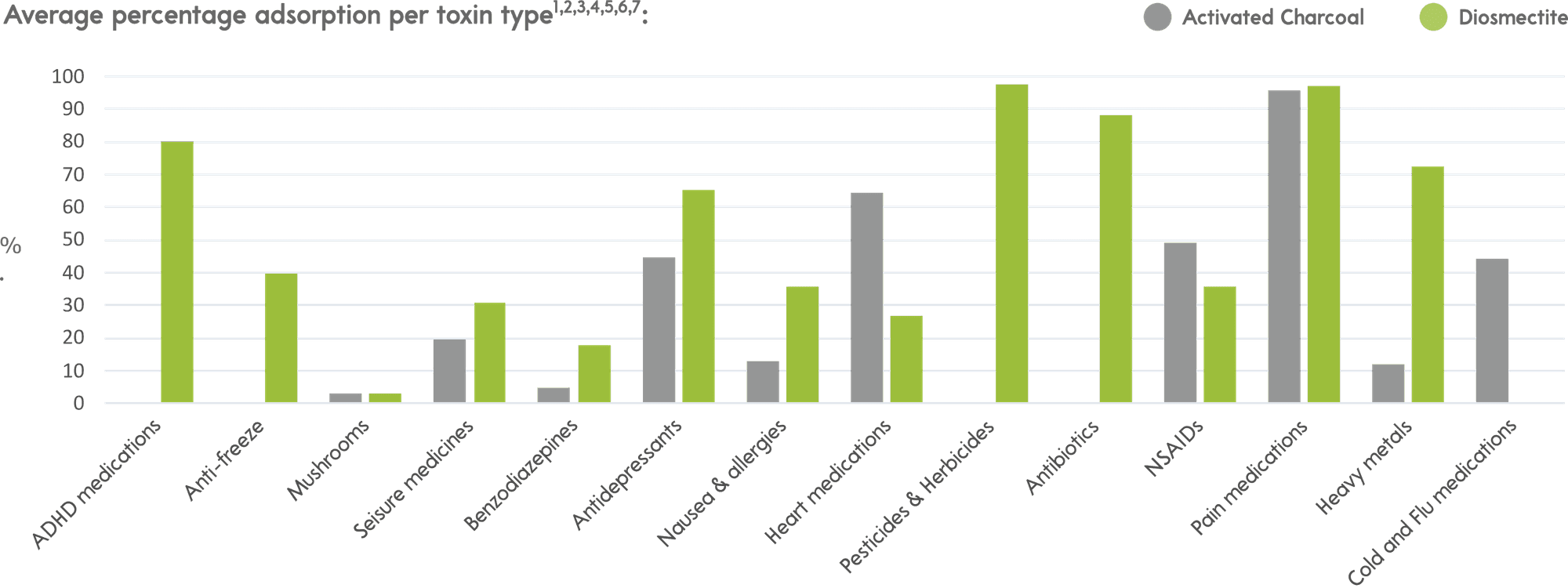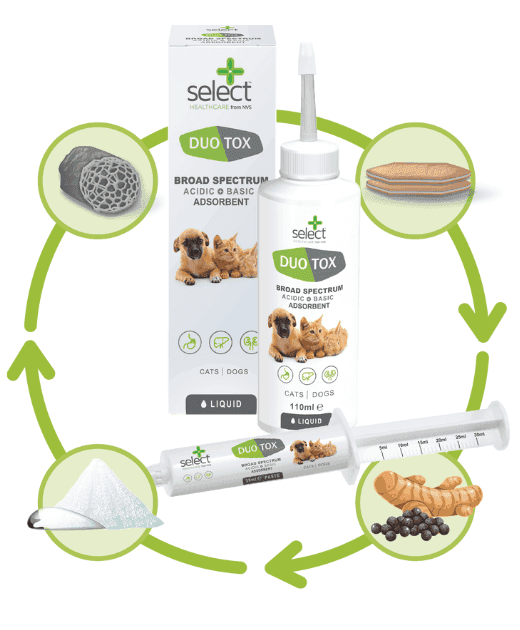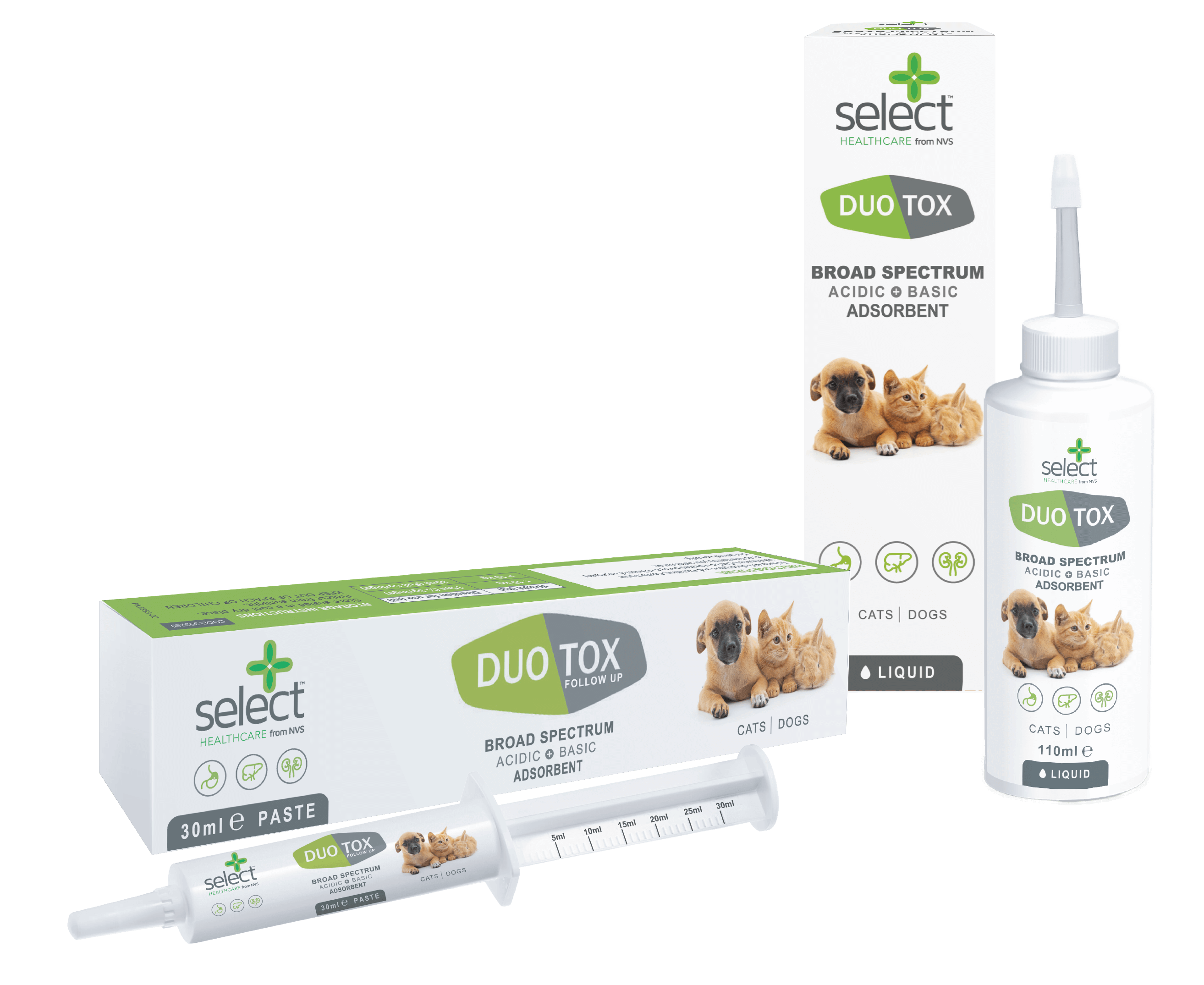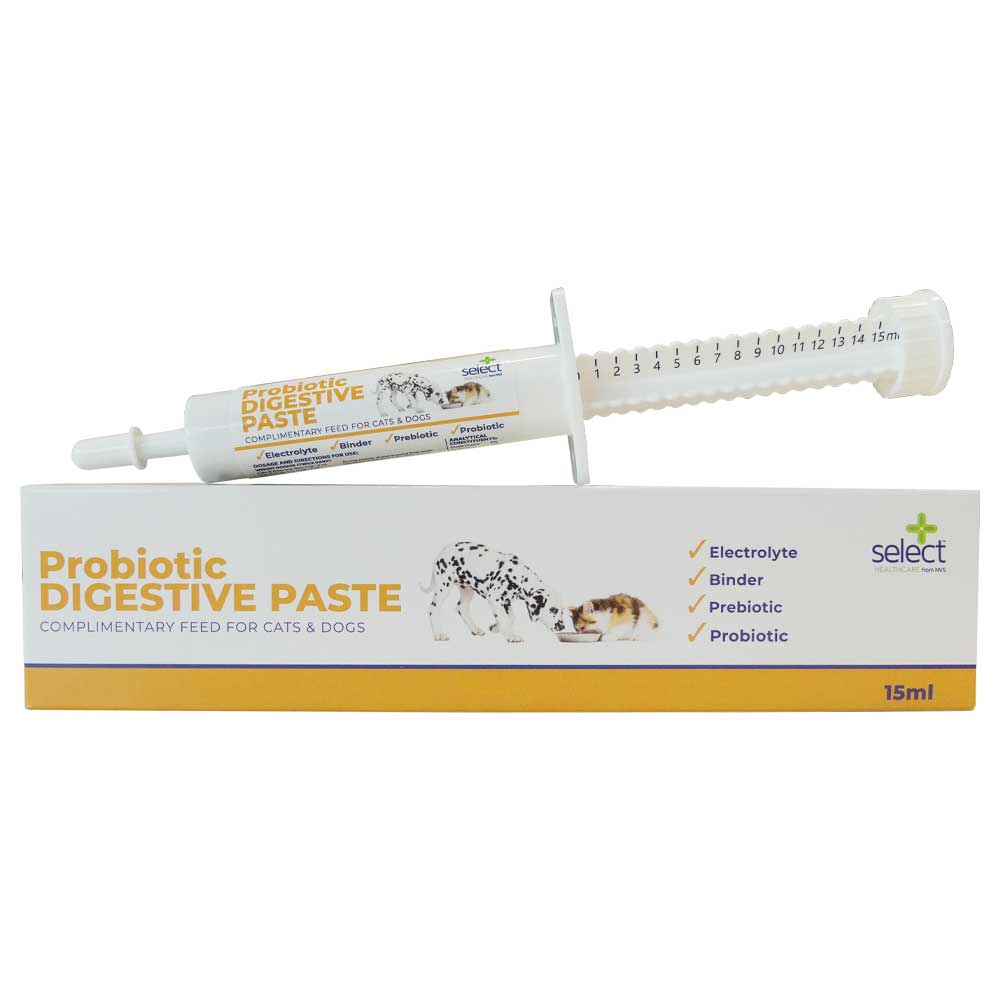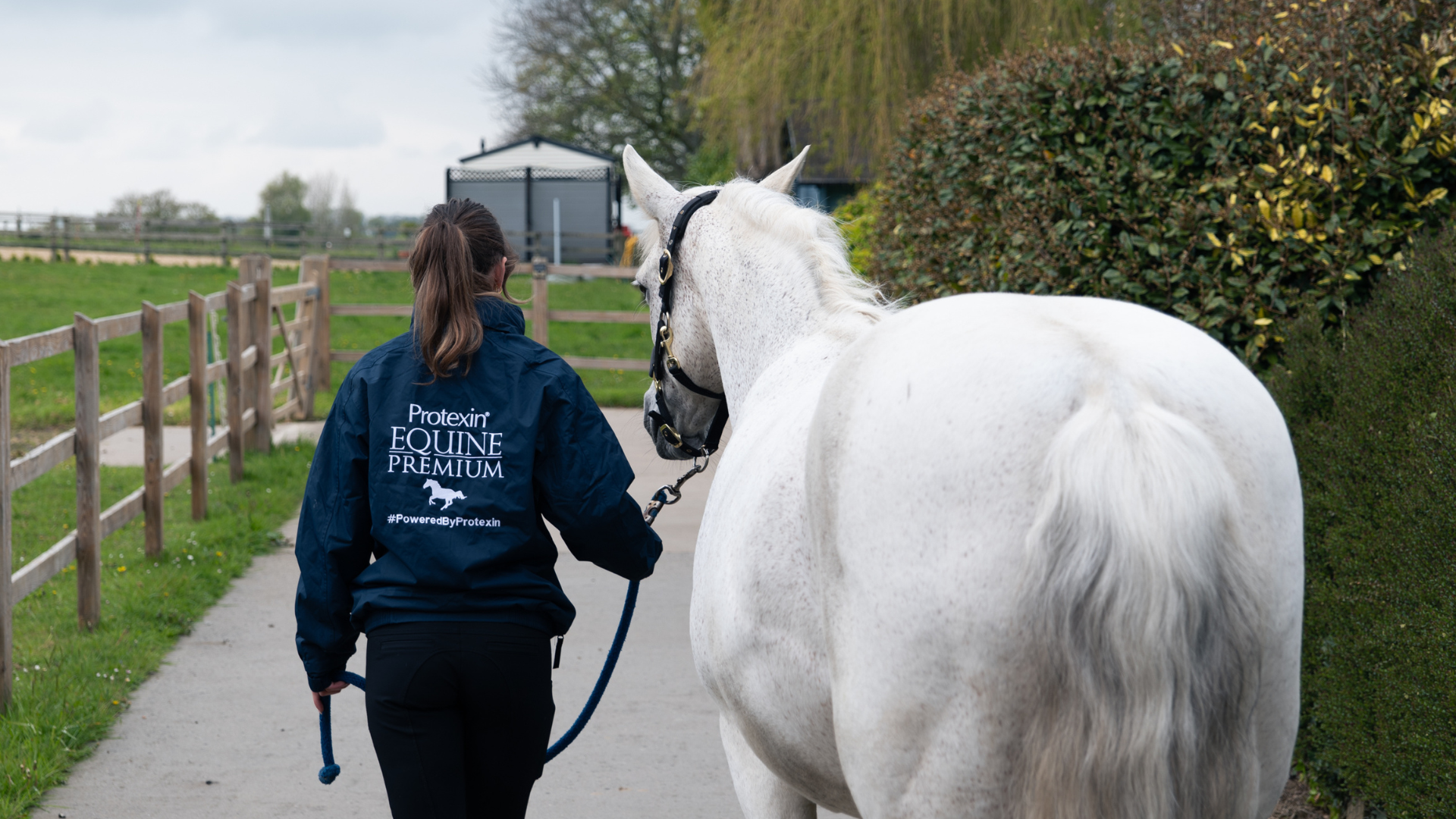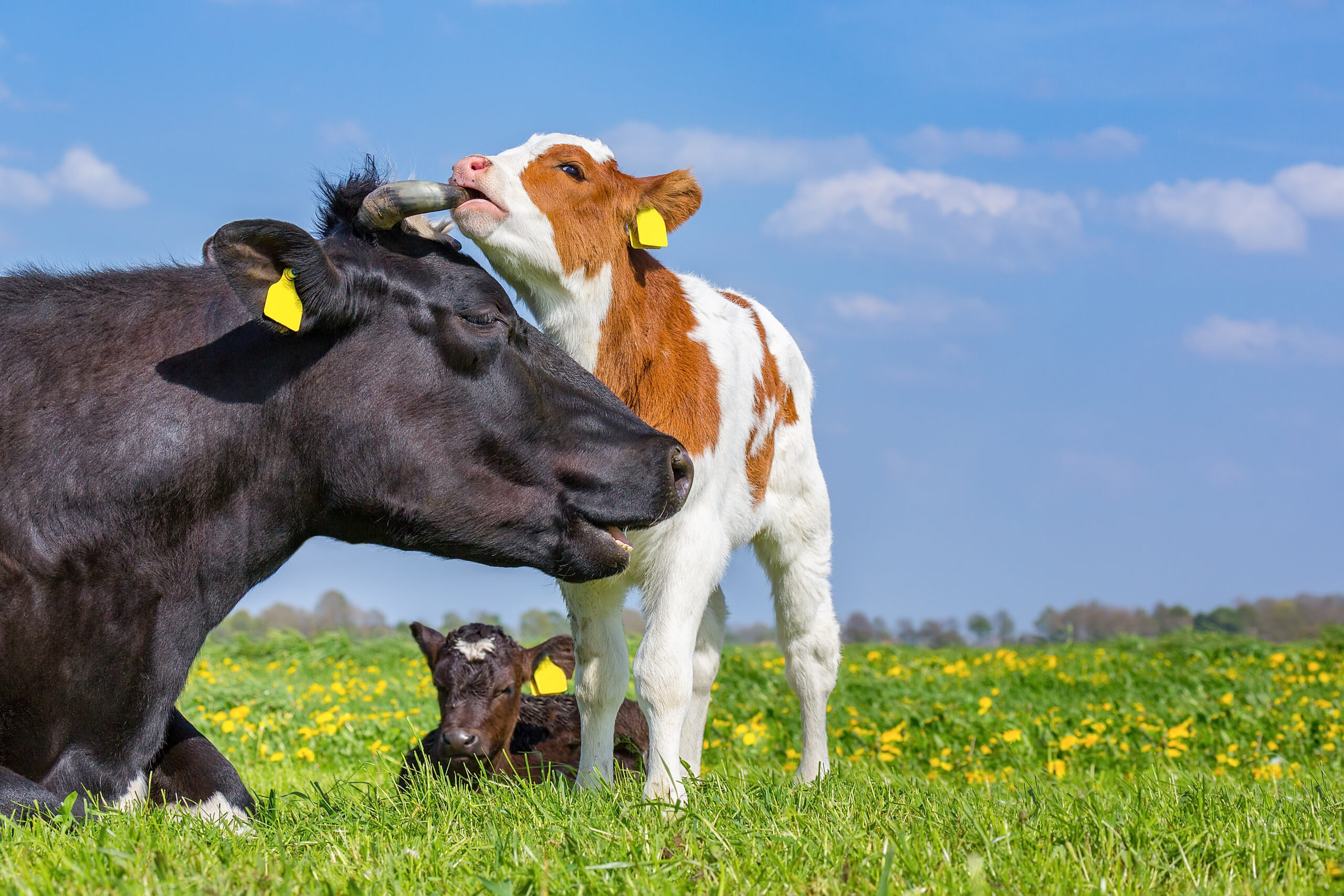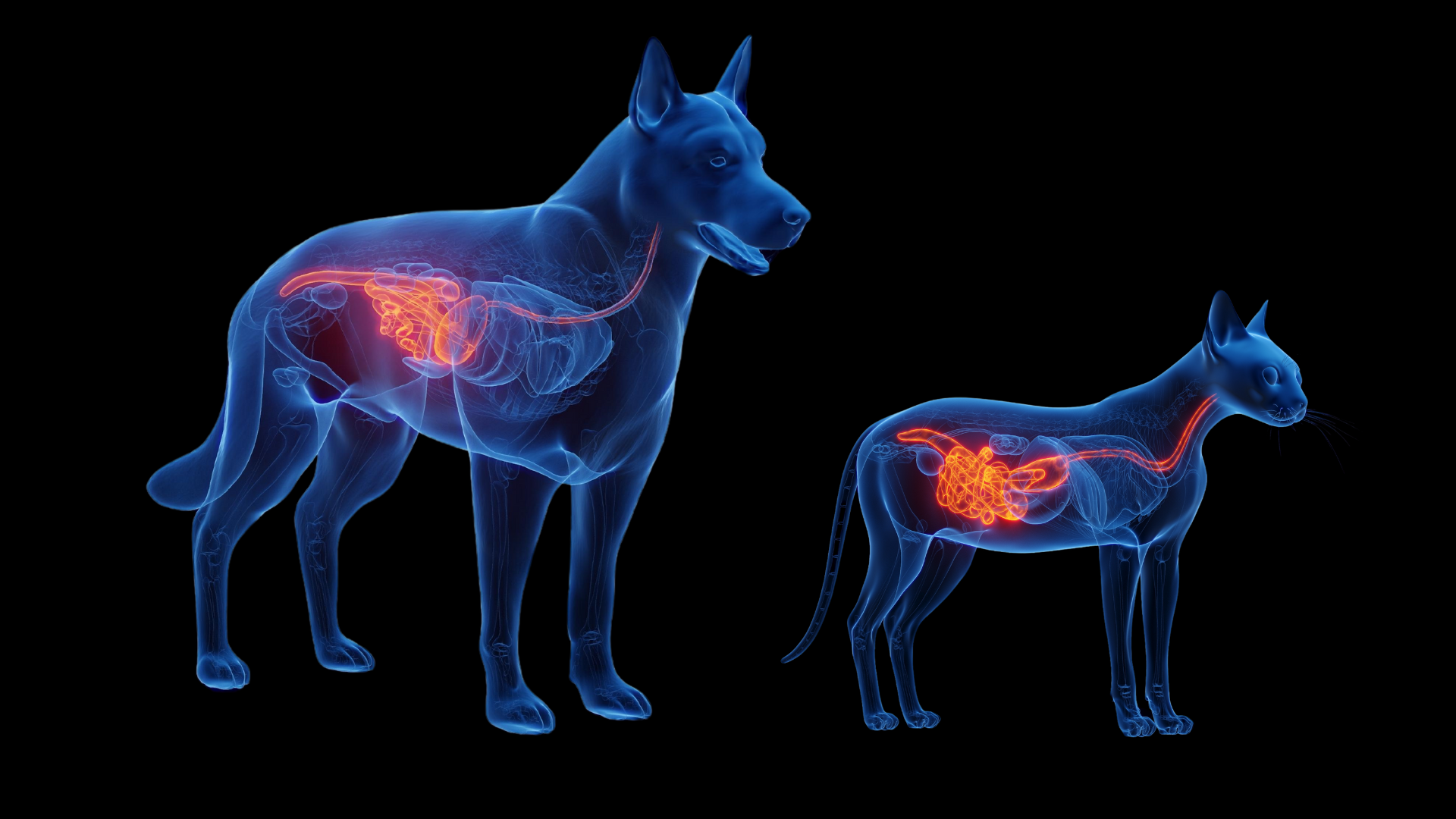
By Katy Ellison MA VetMB MRCVS on behalf of Select Healthcare from NVS
Gastrointestinal (GI) disorders are among the most common reasons for veterinary consultations. The prevalence of enteropathies in dogs is reported to be around 10%,1 while in cats it is approx. 8.5%.2
These disorders range from mild, self-limiting conditions like transient diarrhoea, to chronic conditions such as inflammatory bowel disease (IBD). Effective management of these cases in first opinion practice is essential not only for ensuring the well-being of pets but also for maintaining a positive relationship with owners.
Understanding the gut microbiome: the foundation of digestive health
The gut microbiome is a complex ecosystem of trillions of micro-organisms, including bacteria, viruses and fungi. It is now widely accepted that a healthy, balanced gut microbiome is essential for maintaining gastrointestinal health as it plays a key role in mineral absorption, vitamin synthesis, energy regulation and immune function.
The intestinal epithelium, in turn, produces mucus which serves as a nutrient source for gut bacteria, creating a mutually beneficial relationship. A growing body of evidence suggests that the microbiome also has far-reaching effects on overall health, beyond the digestive system.
Small intestinal dysbiosis
Alterations in the gut microbiome’s composition are referred to as small intestinal dysbiosis.3 This imbalance may result from dietary changes, inflammation, immune deficiency, infection or exposure to antibiotics or toxins. Dysbiosis tends to favour the growth of potentially pathogenic bacteria, leading to harmful bacterial blooms.
In dogs and cats, small intestinal dysbiosis often manifests as chronic, intermittent diarrhoea. Dysbiosis has also been linked to conditions such as obesity, metabolic diseases, cancer and even neurological conditions.4
Therefore treating dysbiosis and supporting a healthy gut microbiome is essential when managing GI disease, but it is equally important in maintaining the health of dogs and cats that have no clinical signs.
Acute diarrhoea: a common presentation
Acute diarrhoea is one of the most frequent reasons for veterinary visits, especially in dogs. Historically, antibiotics were commonly prescribed for diarrhoea but awareness of antibiotic stewardship, alongside a focus on evidence-based medicine has led to a shift in treatment practices.
Most acute diarrhoea cases are not caused by pathogenic bacteria5 and studies have shown that there is no association between antibiotic use and resolution of clinical signs.6 Inappropriate antibiotic use can also cause dysbiosis5 and result in long-lasting alterations in the gut microbiome. The resolution of acute canine diarrhoea is more positively associated with the use of gastrointestinal nutraceuticals and dietary modification than with antibiotics.7
When should antibiotics be used?
While antibiotics are typically avoided in most diarrhoea cases, there are specific situations where their use is warranted:
- Significant immunosuppression: patients with conditions like parvovirus are at high risk for bacterial translocation from the GI tract
- Intestinal mucosal barrier compromise: conditions such as haemorrhagic enteritis increase the likelihood of bacterial translocation across the intestinal wall
- Identified pathogens: when a specific pathogen, such as enteroinvasive Escherichia coli is identified
- Antimicrobial-responsive diarrhoea (ARD): metronidazole is often used in ARD, although some patients may respond better to tetracyclines
In most other cases, alternative options such as prebiotics, probiotics and adsorbents should be prioritised over antibiotics.
The pathophysiology of diarrhoea
Diarrhoea, regardless of its underlying cause, generally results from reduced water absorption by the GI tract (osmotic diarrhoea) or increased water secretion (secretory diarrhoea).
This can lead to significant physiological disturbances, including:
- Dehydration
- Loss of electrolytes
- Inflammation
- Microbiome alteration
- Changes to the mucous lining of the GI tract
- Damage to enterocytes
So, in addition to fluid replacement and dietary management (highly digestible gastro-intestinal support diets or low-fat diets for example), prebiotics and probiotics play an essential role in supporting recovery and restoring GI health.
Stabilising the gut: the role of adsorbents
Adsorbents such as Diosmectite (also known as bentonite or montmorillonite), are also effective in managing diarrhoea by absorbing water and adsorbing toxins and pathogens. These compounds help stabilise the intestinal environment, support normal immune function and maintain mucosal integrity.
Diosmectite is 50 times more effective than kaolin, due to its unique layered structure and cation exchange properties, which enhance its water absorption capacity.
Supporting the gut: the role of prebiotics and probiotics
Prebiotics – indigestible carbohydrates that help encourage the growth and activity of beneficial bacteria. Commonly used prebiotics include oligosaccharides such as mannan oligosaccharides (MOS) and fructo oligosaccharides (FOS). These compounds act as a nutrient source and also as substrates for the production of short-chain fatty acids (SCFAs) such as butyrate, which nourish the intestinal epithelium and have anti-inflammatory effects.
Probiotics – live microorganisms that, when administered in adequate amounts, confer a health benefit to the host.9 Commonly used probiotics in veterinary medicine include Enterococcus, Lactobacillus and Bifidobacterium species. The mechanism of action varies depending on the species and strain, but in general, probiotics promote a healthy microbial balance, support healthy digestion and aid in normal immune function. Moreover, in cases where antibiotics are indicated, probiotics help mitigate the impact on the gut microbiome.
Introducing Probiotic Digestive Paste for cats & dogs
Probiotic Digestive paste combines Diosmectite with prebiotics and probiotics to reduce acute intestinal adsorptive disorders during diarrhoea and to support recovery after clinical signs have resolved.
Low-fat content – provides additional support for recovery from severe diarrhoea
Electrolytes – helps to restore and maintain electrolyte balance in the body.
Essential energy source – formulated with dextrose and glutamine
Designed for ease of use:
- Paste in dial-a-dose syringe
- 15ml/30ml/60ml options
- Palatable formulation
- Wide syringe tip for ease of application
STABILISE + SUPPORT + ENERGISE
Tackling toxicity with adsorbents
Beyond GI disorders, the adsorbent properties of Diosmectite also play an important role in addressing accidental toxicity. Many toxin exposures involve unknown substances and it is the chemical properties of these substances that determine which binders are most suitable.
Activated Charcoal
High affinity for acidic molecules
The carbon, hydroxyl and carboxylic groups are able to adsorb different molecules with differing affinities.
- Acidic substances
- Non-ionised substances
- Poorly water-soluble substances
- Non-polar organic molecules
- Anionic particles
- Non-Specific adsorption
Diosmectite
High affinity for basic molecules
The high surface charge between its negatively charged outer layers and positively charged inner layers, gives it a high cation exchange capacity and powerful adsorptive capacity.
- Alkaline or basic substances
- Hydrophilic substances
- Cationic compounds
- Amphoteric compounds
- Non-ionic compounds
- Organic solutes
- Specific adsorption
The percentage absorption of some commonly presented toxic substances, including medications, pesticides and heavy metals and how they differ between Activated Charcoal and Diosmectite can be seen in the following graph.
For cases involving unknown toxins, broad-spectrum binding is essential and products like Select from NVS Duotox, which combines the tried and tested ingredients of Diosmectite with Activated Charcoal, offer comprehensive coverage.
Discover more about toxins and adsorbents… In this free webinar by Simon Boulton, BVetMed (Hons) MRCVS
Introducing Duotox
Duotox is a broad-spectrum toxin binder containing a combination of Activated Charcoal and Diosmectite. A complimentary feed to help with adsorption and excretion, it is suitable for dogs, cats and fur animals. Duotox also contains:
Sorbitol – retains water in the large intestine through osmotic pressure, exerting a diuretic, laxative and cathartic effect.
Glycerine – acts as a cathartic, increasing the urge to defecate, and decreasing GIT transit time and systemic absorption of toxins.
Curcumin – aids in renal and liver protection by reducing the expression of tight-junction proteins, suppressing proinflammatory cytokines, and the reduction of oxidative stress within the liver.
Piperine – enhances absorption of curcumin, thereby increasing clinical outcomes of free radical scavenging and downregulation of inflammatory mediators.
Designed with ‘use’ in mind, Duotox is available in both liquid suspension for first administration and a 30ml paste for follow on administration where necessary. 60ml paste coming soon!
Duotox Liquid
- Soft, squeezy bottle and bendy nozzle to aid administration
- Nozzle fits directly to tubes
Duotox Paste
- Dial-a-dose syringe for easy administration
- Wide nozzle bore for ease of flow
- Reduces pressure needed on plunger
- Reduces risk of blocking and sudden product release
- Up to 75% wider than other products
ADSORB + ELIMINATE + SUPPORT
Read more…
Part two of the series Supporting canine & feline gastrointestinal health (part two) – top tips for talking to clients offers top tips for talking to your clients about the gastrointestinal health of their pets.
More about the author:
Katy Ellison, Companion Consultancy
Katy, MA VetMB MRCVS, has worked in veterinary practice for over 20 years and enjoys all aspects of veterinary medicine and surgery. She began her career in mixed practice before joining a small animal practice in Suffolk in 2003. Since 2021 she has combined her love of clinical work with her role at Companion Consultancy, where she relishes the opportunity to use her veterinary skills in a different way, while continuing to work in practice part-time.
The article was originally posted in The Cube magazine, October 2024 issue. Click here to read the magazine.
